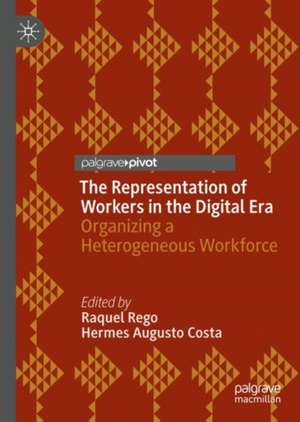The Representation of Workers in the Digital Era: Organizing a Heterogeneous Workforce: Dynamics of Virtual Work
Editat de Raquel Rego, Hermes Augusto Costaen Limba Engleză Hardback – 8 aug 2022
Din seria Dynamics of Virtual Work
- 20%
 Preț: 691.18 lei
Preț: 691.18 lei -
 Preț: 384.48 lei
Preț: 384.48 lei - 15%
 Preț: 699.28 lei
Preț: 699.28 lei - 15%
 Preț: 641.71 lei
Preț: 641.71 lei - 15%
 Preț: 698.15 lei
Preț: 698.15 lei - 18%
 Preț: 784.13 lei
Preț: 784.13 lei - 15%
 Preț: 704.04 lei
Preț: 704.04 lei - 15%
 Preț: 700.94 lei
Preț: 700.94 lei - 18%
 Preț: 728.91 lei
Preț: 728.91 lei -
 Preț: 390.25 lei
Preț: 390.25 lei - 15%
 Preț: 646.62 lei
Preț: 646.62 lei - 18%
 Preț: 784.92 lei
Preț: 784.92 lei - 15%
 Preț: 500.26 lei
Preț: 500.26 lei -
 Preț: 217.07 lei
Preț: 217.07 lei - 18%
 Preț: 958.73 lei
Preț: 958.73 lei - 15%
 Preț: 582.95 lei
Preț: 582.95 lei - 18%
 Preț: 779.26 lei
Preț: 779.26 lei - 18%
 Preț: 727.00 lei
Preț: 727.00 lei -
 Preț: 389.31 lei
Preț: 389.31 lei - 18%
 Preț: 783.35 lei
Preț: 783.35 lei - 18%
 Preț: 726.23 lei
Preț: 726.23 lei - 18%
 Preț: 785.55 lei
Preț: 785.55 lei - 15%
 Preț: 640.88 lei
Preț: 640.88 lei
Preț: 358.81 lei
Nou
Puncte Express: 538
Preț estimativ în valută:
68.67€ • 71.50$ • 58.03£
68.67€ • 71.50$ • 58.03£
Carte disponibilă
Livrare economică 17 februarie-03 martie
Livrare express 01-07 februarie pentru 32.77 lei
Preluare comenzi: 021 569.72.76
Specificații
ISBN-13: 9783031046513
ISBN-10: 303104651X
Pagini: 190
Ilustrații: XV, 190 p.
Dimensiuni: 148 x 210 x 19 mm
Greutate: 0.4 kg
Ediția:1st ed. 2022
Editura: Springer International Publishing
Colecția Palgrave Macmillan
Seria Dynamics of Virtual Work
Locul publicării:Cham, Switzerland
ISBN-10: 303104651X
Pagini: 190
Ilustrații: XV, 190 p.
Dimensiuni: 148 x 210 x 19 mm
Greutate: 0.4 kg
Ediția:1st ed. 2022
Editura: Springer International Publishing
Colecția Palgrave Macmillan
Seria Dynamics of Virtual Work
Locul publicării:Cham, Switzerland
Cuprins
Chapter 1Introduction.- Chapter 2Precarious work and possibilities of union resistance in Brazil.- Chapter 3How to represent the unrepresented? Renewing the collective action repertoires of autonomous workers in three countries.- Chapter 4Digitization and collective representation strategies in Spain.- Chapter 5The representation of precarious workers: two case studies from Portugal.- Chapter 6Work platforms, informality and forms of resistance: the case of on-demand workers in the city of São Paulo.- Chapter 7Gender representation in the high-tech sector in Italy: the required alliance between trade unions and women associations.- Chapter 8The representation of platform workers through Facebook groups in Bulgaria – a partially-filled void.- Chapter 9Conclusion.
Notă biografică
Raquel Rego is a Research Fellow at the Instituto de Ciências Sociais from the Universidade de Lisboa, Portugal, where she also teaches both in the PhD Program of Sociology-OpenSoc and in the PhD Program of Comparative Politics and International Relations.
Hermes Augusto Costa is Vice-Dean and Professor at the Faculty of Economics from the Universidade de Coimbra, and a Researcher at Centro de Estudos Sociais, Portugal. He co-coordinates the PhD Program in Sociology: Labour Relations, Social Inequalities and Trade Unionism.
Hermes Augusto Costa is Vice-Dean and Professor at the Faculty of Economics from the Universidade de Coimbra, and a Researcher at Centro de Estudos Sociais, Portugal. He co-coordinates the PhD Program in Sociology: Labour Relations, Social Inequalities and Trade Unionism.
Textul de pe ultima copertă
This book compiles empirical evidence on both the challenges raised by neo-liberal policies and the internet to trade unions, and the development of more flexible forms of worker organisation and collective representation. The relationship with digital devices seems inevitably to contribute to differentiating trends, simultaneously acting as an internal and external constraint on organisation. Gathering academics and experts from European and Brazilian universities, this book is recommended for researchers and students in the fields of sociology of work, labour studies and collective action, as well as practitioners and others interested in worker interest organisations and collective representation in the early 21st Century.
Raquel Rego is a Research Fellow at the Instituto de Ciências Sociais from the Universidade de Lisboa, Portugal, where she also teaches both in the PhD Program of Sociology-OpenSoc and in the PhD Program of Comparative Politics and International Relations.
Hermes Augusto Costa is Vice-Dean and Professor at the Faculty of Economics from the Universidade de Coimbra, and a Researcher at Centro de Estudos Sociais, Portugal. He co-coordinates the PhD Program in Sociology: Labour Relations, Social Inequalities and Trade Unionism.
Raquel Rego is a Research Fellow at the Instituto de Ciências Sociais from the Universidade de Lisboa, Portugal, where she also teaches both in the PhD Program of Sociology-OpenSoc and in the PhD Program of Comparative Politics and International Relations.
Hermes Augusto Costa is Vice-Dean and Professor at the Faculty of Economics from the Universidade de Coimbra, and a Researcher at Centro de Estudos Sociais, Portugal. He co-coordinates the PhD Program in Sociology: Labour Relations, Social Inequalities and Trade Unionism.
Caracteristici
Focuses on worker collective representation as an essential tool for providing a dignified working existence Draws on rich empirical case studies, focusing non-Anglo-Saxon countries Analyses social, political, and legal perspectives of worker organisation
